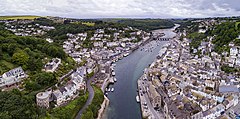West Looe
Looe
|
|
|---|---|
 |
|
| Looe shown within Cornwall | |
| Population | 5,112 (United Kingdom Census 2011) |
| OS grid reference | SX254533 |
| Civil parish |
|
| Unitary authority | |
| Ceremonial county | |
| Region | |
| Country | England |
| Sovereign state | United Kingdom |
| Post town | LOOE |
| Postcode district | PL13 |
| Dialling code | 01503 |
| Police | Devon and Cornwall |
| Fire | Cornwall |
| Ambulance | South Western |
| EU Parliament | South West England |
| UK Parliament | |
Looe (Cornish: Logh, meaning deep water inlet) is a small coastal town, fishing port and civil parish in south-east Cornwall, England, with a population of 5,280 at the 2011 census.
Looe is 20 miles (32 km) west of Plymouth and seven miles (11 km) south of Liskeard, divided in two by the River Looe, East Looe (Cornish: Logh) and West Looe (Cornish: Porthbyhan, meaning Little Cove) being connected by a bridge. Looe developed as two separate towns each with MPs and its own mayor.
The town centres around a small harbour and along the steep-sided valley of the River Looe which flows between East and West Looe to the sea beside a sandy beach. Offshore to the west, opposite the stonier Hannafore Beach, lies Looe Island.
Archeological evidence, such as the so-called Giant's Hedge and the stone circle at Bin Down (from the Cornish "Bin Dun", meaning "hill fort") on a hill above East Looe, indicates that the area around Looe was inhabited as early as 1000 BC.
At the time of the Domesday Book in 1086 the manor of Pendrym, which included much of the site of modern-day East Looe, was still held by William the Conqueror, as part of his own demesne, which he later devolved to the Bodgrugan (Bodrigan) family. Land across the river belonged to the manors of Portalla (or Portallant) and Portbyhan (variously spelt Portbyan, Porthbyghan, Porthpyghan, among others).
Shutta, on the steep hillside over East Looe, is recorded as being inhabited by the 12th century. Between 1154 and 1189 Henry II granted a charter in favour of Sir Henry Bodrugan as Mayor of East Looe. West Looe was given free borough status sometime after this (the first known historical mention of the town dates from 1327) and in the 1230s East Looe secured the right to hold a weekly market and a Michaelmas fair. East Looe's layout looks like a "planted borough", a concept similar to modern new towns, since most of its streets form a grid-like pattern.
...
Wikipedia

